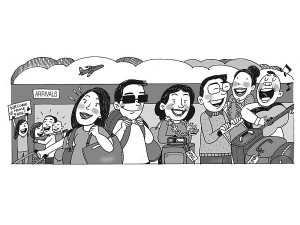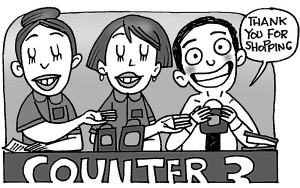Back home: Relearning old ways
Back in the ’80s when the Marcos regime was near its end, we decided to move our family to the United States. People Power was then gaining ground, with constant demonstrations around the city. Yellow confetti frequently rained down from buildings and protesters, fleeing from riot police and tear gas, often sought refuge in my husband’s office in Ayala Avenue.
Life in those days was exciting, but uncertain, and volatile. So we packed our belongings and moved to Los Angeles. Our family of four crowded in a tiny bedroom at a friend’s townhouse. The kids were three and six at that time; so it was like a big camping party for them.
I guess the term for us then was FOB (fresh off the boat). In the early days, most of our clothes, including my husband’s underwear and socks, were pink. We had not yet learned to sort out the coloreds from the whites, as we did our laundry, so everything faded. The kids’ dolls also inherited a lot of our sweaters because we shrunk many of them in the dryer.
Newbies in the US
I worked at many jobs, each one frowned upon by my mother, who still lived in the Philippines. She would tell me, “What? You are a sales girl? You went to America to do that? You were in upper management here.” And when I became a hostess in a restaurant, she was especially upset because the connotation back home was that of a hospitality girl.
We hung out with fellow newbies in America and exchanged info that was helpful to us. We got tips like:
“You can get free cheese and milk in the center if you let your elderly mom sign up!” Or, “Quick! There’s a sale on tuna at Ralph’s. Baka maubos na (it might run out)”—only to discover it was cat food after buying a case. All the goods in our grocery cart matched. Everything had blue and white labels because all we could afford were generic goods. I paid with a lot of singles from my tips as a hostess at the restaurant where I worked.
Novelty and equality
Our décor was “early yard sale” as we furnished the little house we moved into. We bought out first US TV for $10, and every time the picture faded, we would tell my daughter to kick it—and the picture would come back on.
Life was a novelty. Everybody was equal and everything was an adventure. We did not mind the hardships we suffered.
We figured no one knew us there anyway. We worked at all sorts of jobs that we would never have taken back home. For it is true that there is dignity of labor in America. (Well, maybe I did get embarrassed one time—when I ran into a friend at a swap meet where I sold So-en panties.)
Problem: elderly care
Fast forward many years. We had learned how the system worked, acquired properties, moved up the food chain. Except now, we were seniors with our aging parents to worry about. The US is not an easy place for the elderly. Since most able people work, a lot of their elders stay home alone—unless one is financially able to place his or her parents in a seniors’ day care, where they are entertained, cared for, and their needs attended to.
But we Filipinos take care of our own. It is not in our culture to put our old folk in retirement homes. Since our parents are now in their twilight years, my husband and I decided to come back home. We wanted to make sure that our parents continue to enjoy the quality of life they have long enjoyed.
Noting the progress
Back home, we are impressed with so much progress. Skyscrapers soar to the sky. The malls, condos, and new buildings are pretty amazing. Makati has become so cosmopolitan, it feels like another country. Dining out is like participating in a reality show in the Food Channel. The food scene here has never ceased to surprise us: So many talented local chefs; so many innovative and delicious creations;so many first-rate restaurants.
Astounding as the changes are, some things, however, have remained the same. We came back to an old house long neglected in our absence. As we lined up a crew to do the necessary repairs, a plumber showed up. He was dressed in a pair of shorts and a tank top, wearing flip flops. He was carrying a wire hanger, with which he was ready, he told us, to remove the clog in the toilet.
Bad service sector
Then there were the men who worked on our roof. “Why do we need two guys for that job?” my husband asked the foreman. “Sir, it is very hot,” explained the foreman. “The other guy has to hold the umbrella.” They climbed up a rickety ladder with their flip flops and umbrella, wearing no protective gear, not even helmets.
“Don’t underestimate their know-how by the way they are dressed,” I was told. But as we went through numerous workers and their supposed skills, we were frustrated by their lack of professionalism, something we had come to expect when we lived in the US.
We had to learn to expect the work to be done in double the time they promised to complete it. They used old-fashioned tools, coming to our house armed with manual screw drivers and saws. Sanding they did by hand. Aghast, we offered the power tools we brought home—to speed up the job—but they would just stare at us blankly. On the other hand, our hires, we found out, could be quite resourceful and creative in repairing things.
And only in the Philippines can you find signs etched on walls and buildings that befuddle the mind. I went into a hospital bathroom and saw this in the sink. “Bawal maghugas ng paa dito (It is prohibited to wash your feet here).” I just had to take a picture and share it with a friend because it was so funny. Another one I read along EDSA: “Ingat! May namatay na dito (Careful, someone has already died here).” And of course, this one found in so many street corners, “Bawal umihi dito (Don’t urinate here).”
Shopping gauntlet
Shopping here is another new experience. How many people does it take to ring up a sale? Back in the US, we had become used to going to the register, having our items pass through a scanner, paying for them, and then bagging them ourselves. But here, there is the lady who will take the merchandise from you, who will hand it over to another lady, who will write a manual receipt, and then pass it on to yet another lady in the assembly line to ring up.
It doesn’t end there.
Another salesgirl will put your merchandise in a bag, then give it to a stapler lady, who will give it to the checker, who will finally hand it over to you. A friend describes the ritual as “job security.”
All those stories said, we realize that we need to be Filipinized all over again. Having been away for some 27 years, we had forgotten the little nuances so typical in our culture. We had become American and fiercely independent, forgetting that once upon a time we were just like everybody here at home.
Feeling special again
We are still very glad we made the decision to come back. Aside from the fact that this country boasts of the best senior perks ever, it is nice to live in a place where you are treated with respect and made to feel special. Even if the decision we made to return was for our parents, they are not the only ones benefitting from our move. Our lives have come full circle and we are so happy to be back, to enjoy that unique and quintessential quality of life, so familiar to most Filipinos, for the rest of our years.


